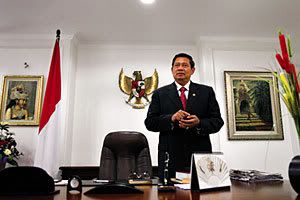President Susilo Bambang Yudhoyono said here on Tuesday that he purposefully formed a presidential working team for program, policy and reform management as he was facing highly complex problems.
Yudhoyono said in a press conference at the Halim Perdana Kusuma military airbase that it is normal for heads of state or government in other countries to have such a team.

The President held the conference upon arrival at the airport at 8 pm from a four-day visit to China.
The President as an example mentioned prime minister`s delivery units and presidential delivery units in other countries to provide inputs and analyses on programs their governments must carry out.
"Of course, I need such a facility in view of the complex problems I am facing as president," he added. "I ask for assistance to check whether a problem has been solved or not. This is what I need from this team."
He did not elaborate on the complex problems facing him.
He, however, said he needed the team to see that all the government`s programs and agenda are being carried out properly and well.
The team supervised by the President and has an office in the State Palace is chaired by former attoney general Marsilam Simanjuntak, who is assisted by Agus Wijoyo and Edwin Parengkuan. The team was formed on September 29, 2006.
The president assured that the team would not be opposed to his cabinet`s working process.
In responding to the President`s step in setting up a new team to manage five programs and special policies, DR. J. Kristiadi of the Centre for Strategic and International Studies (CSIS) said here Friday that President Susilo Bambang Yudhoyono seemed no longer capable to manage a rotten and corrupt bureaucracy.
"It is understandable. But the President must therefore make reforms in the rotten and corrupt bureaucracy, " the political observer said.
He said the President`s step clearly showed an "uncontrolled situation of our bureaucracy" . Hence Yudhoyono formed the team to make reforms in the bureaucracy, investment, state-owned enterprises, small and medium scale firms and in the law.
When contacted separately Dr Iwan Gunawan, an expert staff of the Regional Representatives Council (DPD), said the reforms should be implemented by the executive led by the President.
"Members of the cabinet alone can not (conduct reforms). How can this be done by a pseudo cabinet comprising three people? It will create worry and resistance from the ministers who deal with bureaucratic management," he said.
The two shared the view that the President must dismantle the existing mechanism or replace those obstructing the bureauracy.
They also reminded the President to be careful and prevent the team from becoming a boomerang
Yudhoyono said in a press conference at the Halim Perdana Kusuma military airbase that it is normal for heads of state or government in other countries to have such a team.

The President held the conference upon arrival at the airport at 8 pm from a four-day visit to China.
The President as an example mentioned prime minister`s delivery units and presidential delivery units in other countries to provide inputs and analyses on programs their governments must carry out.
"Of course, I need such a facility in view of the complex problems I am facing as president," he added. "I ask for assistance to check whether a problem has been solved or not. This is what I need from this team."
He did not elaborate on the complex problems facing him.
He, however, said he needed the team to see that all the government`s programs and agenda are being carried out properly and well.
The team supervised by the President and has an office in the State Palace is chaired by former attoney general Marsilam Simanjuntak, who is assisted by Agus Wijoyo and Edwin Parengkuan. The team was formed on September 29, 2006.
The president assured that the team would not be opposed to his cabinet`s working process.
In responding to the President`s step in setting up a new team to manage five programs and special policies, DR. J. Kristiadi of the Centre for Strategic and International Studies (CSIS) said here Friday that President Susilo Bambang Yudhoyono seemed no longer capable to manage a rotten and corrupt bureaucracy.
"It is understandable. But the President must therefore make reforms in the rotten and corrupt bureaucracy, " the political observer said.
He said the President`s step clearly showed an "uncontrolled situation of our bureaucracy" . Hence Yudhoyono formed the team to make reforms in the bureaucracy, investment, state-owned enterprises, small and medium scale firms and in the law.
When contacted separately Dr Iwan Gunawan, an expert staff of the Regional Representatives Council (DPD), said the reforms should be implemented by the executive led by the President.
"Members of the cabinet alone can not (conduct reforms). How can this be done by a pseudo cabinet comprising three people? It will create worry and resistance from the ministers who deal with bureaucratic management," he said.
The two shared the view that the President must dismantle the existing mechanism or replace those obstructing the bureauracy.
They also reminded the President to be careful and prevent the team from becoming a boomerang
Comments